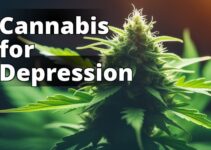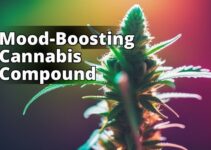What you will learn by reading this article:
- The chemical structure and effects of delta-8 THC and CBD
- The production and regulation of delta-8 THC and CBD
- The potential therapeutic benefits of delta-8 THC and CBD
- The legality and regulatory status of delta-8 THC and CBD
- Testing and purity concerns related to delta-8 THC products
- How to choose between delta-8 THC and CBD products
The popularity of cannabinoids has been on the rise in recent years, with individuals seeking natural alternatives for various health concerns. Two cannabinoids that have gained significant attention are delta-8 THC and CBD. In this ultimate guide, we will explore the similarities and differences between delta-8 THC and CBD to help you make an informed decision about which option may be best for you.
Chemical Composition and Effects
1.1 Delta-8 THC
Delta-8 THC, or delta-8-tetrahydrocannabinol, is a cannabis compound that is structurally similar to the more well-known delta-9 THC, the primary psychoactive component of cannabis. The main difference between delta-8 THC and delta-9 THC lies in the placement of a double bond on the carbon chain. Delta-8 THC has the double bond on the 8th carbon, while delta-9 THC has it on the 9th carbon. This slight difference in structure leads to different effects on the body.
Delta-8 THC is psychoactive, meaning it can produce a “high” or euphoric feeling. However, its psychoactive effects are generally considered to be milder than those of delta-9 THC. Users often report feeling relaxed, uplifted, and potentially experiencing pain relief with delta-8 THC. It is important to note that individual experiences may vary, and the effects of delta-8 THC can depend on factors such as dosage and individual tolerance.
1.2 CBD
CBD, or cannabidiol, is another prominent cannabinoid found in the cannabis plant. Unlike delta-8 THC, CBD is non-intoxicating, which means it does not produce a “high” or alter one's state of mind. CBD has gained popularity for its potential therapeutic effects, including managing chronic pain, reducing stress and anxiety, and promoting relaxation.
While CBD does not have the same psychoactive effects as delta-8 THC, it interacts with the body's endocannabinoid system, which plays a role in regulating various physiological processes. CBD can influence receptors in the endocannabinoid system, potentially providing relief from certain symptoms or conditions.
Production and Regulation
2.1 Delta-8 THC
Delta-8 THC does not naturally occur in large amounts in hemp plants, which are commonly used to produce CBD. Instead, delta-8 THC is typically synthesized by converting cannabidiol (CBD) or delta-9 THC through chemical processes. This synthesis process involves the use of industrial chemicals, which raises safety concerns.
The production of delta-8 THC is not as well-regulated as that of CBD. Due to the lack of comprehensive regulations, there is a risk of impurities and unknown compounds in delta-8 THC products. Chemists have raised concerns about the synthesis process of delta-8 THC, as it can result in the presence of impurities and by-products that may be harmful. Limited testing and oversight in the delta-8 THC industry further exacerbate these concerns.
2.2 CBD
CBD can be derived from both hemp and marijuana plants, but it is primarily extracted from hemp due to its high CBD content and low THC levels. The production of CBD from hemp is subject to stricter regulations compared to delta-8 THC. Hemp-derived CBD products must comply with the guidelines set forth by the Farm Bill, which allows for the legal cultivation, production, and sale of hemp and hemp-derived products.
Various extraction methods, such as CO2 extraction and solvent extraction, are used to obtain CBD from the cannabis plant. These methods ensure the removal of unwanted compounds and the preservation of CBD's beneficial properties. Reputable CBD manufacturers prioritize quality control and often provide third-party lab testing to verify the purity and potency of their products.
Potential Therapeutic Benefits
3.1 Delta-8 THC
Delta-8 THC has shown potential therapeutic benefits, similar to other cannabinoids. Some users report that delta-8 THC helps alleviate pain, reduce inflammation, and induce relaxation. However, more research is needed to fully understand the therapeutic potential of delta-8 THC and its specific effects on various conditions.
3.2 CBD
CBD has been extensively studied for its potential therapeutic benefits. Research suggests that CBD may have analgesic and anti-inflammatory properties, making it a promising option for managing chronic pain. Additionally, CBD has shown potential in reducing anxiety and stress, promoting sleep, and supporting overall well-being. However, it is essential to consult with a healthcare professional before using CBD for specific health conditions.
It is worth mentioning that both delta-8 THC and CBD interact with the endocannabinoid system, but they have different effects due to their distinct chemical structures. While delta-8 THC is intoxicating and psychoactive, CBD is non-intoxicating and does not produce a “high.” The choice between the two depends on an individual's preferences and desired effects.
Case Study: The Therapeutic Benefits of CBD
III. Potential Therapeutic Benefits:
When it comes to managing chronic pain, CBD has shown great promise in providing relief. Let me share the story of Sarah, a 45-year-old woman who had been suffering from chronic back pain for several years.
Sarah had tried various treatments, including physical therapy, medication, and even surgery, but nothing seemed to alleviate her pain for the long term. Frustrated and desperate for relief, she decided to explore alternative options and came across CBD.
After extensive research and consulting with her healthcare provider, Sarah decided to give CBD a try. She started taking CBD oil daily, and over time, she noticed a significant reduction in her back pain. Not only did the pain become more manageable, but she also experienced improved sleep and reduced anxiety levels.
Encouraged by these positive results, Sarah continued incorporating CBD into her daily routine. With consistent use, she found that her pain levels became more manageable, allowing her to engage in activities she had previously avoided.
Sarah's experience is not unique. Many individuals have reported similar benefits from using CBD for pain management. While more research is needed to fully understand the mechanisms behind CBD's therapeutic effects, the existing evidence suggests its potential as a natural alternative for chronic pain management.
If you are considering CBD for pain relief or other therapeutic benefits, it is crucial to consult with your healthcare provider to ensure it is suitable for your specific situation. They can provide guidance on dosage, potential interactions with other medications, and help monitor your progress.
Remember, CBD is not a one-size-fits-all solution, and what works for one person may not work for another. It is essential to prioritize your health and safety by making informed choices and seeking reputable sources for CBD products.
Legality and Regulatory Status
4.1 Delta-8 THC
The legal status of delta-8 THC is complex and can vary between states. At the federal level, delta-8 THC is considered a Schedule I controlled substance, similar to delta-9 THC. However, some states have enacted laws that allow for the sale and possession of delta-8 THC products. These states often have legal loopholes or specific regulations that enable the sale of delta-8 THC.
It is important to note that the legality of delta-8 THC products can change over time, as regulations continue to evolve. Consumers should stay informed about the specific laws in their state and ensure compliance with local regulations.
4.2 CBD
CBD derived from hemp is legal under the Farm Bill, as long as it contains no more than 0.3% delta-9 THC. This legislation has opened up opportunities for the production and sale of CBD products across the United States. However, the legality of CBD can vary in states with recreational or medical cannabis programs, as these states may have different regulations regarding CBD products derived from marijuana.
Consumers should be aware of the legal requirements and restrictions regarding CBD in their state of residence. It is advisable to purchase CBD products from reputable sources that comply with industry standards and provide lab testing results to ensure product quality and legality.
| Delta-8 THC | CBD | |
|---|---|---|
| Chemical Composition | Similar to delta-9 THC, but with a double bond on the 8th carbon | Non-intoxicating |
| Effects | Psychoactive, but milder than delta-9 THC | Non-intoxicating, potential therapeutic effects |
| Production | Synthesized from CBD or delta-9 THC through chemical processes | Extracted from hemp or marijuana plants |
| Regulation | Less regulated, risk of impurities and unknown compounds | Subject to stricter regulations, compliance with Farm Bill |
| Potential Therapeutic Benefits | Alleviates pain, reduces inflammation, induces relaxation | Analgesic, anti-inflammatory, reduces anxiety and stress |
| Legality | Complex and can vary between states | Legal under Farm Bill, but can vary in states with recreational or medical cannabis programs |
| Testing and Purity Concerns | Limited testing and oversight, concerns about impurities and unknown compounds | Reputable brands prioritize quality control and provide third-party lab testing |
| Choosing the Right Option | Consult with healthcare professional, research reputable brands, consider preferences and desired effects, stay informed about regulations | Consult with healthcare professional, research reputable brands, consider preferences and desired effects, stay informed about regulations |
Testing and Purity Concerns
The rising popularity of delta-8 THC has raised concerns among chemists regarding the safety and purity of delta-8 THC products. The synthesis process of delta-8 THC often results in impurities and unknown compounds that may pose risks to consumers. Limited testing and oversight in the industry further exacerbate these concerns.
Chemists advocate for better regulation and testing to ensure the safety and purity of delta-8 THC products. Consumers are encouraged to choose reputable brands that prioritize quality control and provide third-party lab testing results. By doing so, consumers can make more informed decisions and minimize potential health risks associated with impurities or unknown compounds.
Choosing the Right Option
When considering delta-8 THC and CBD products, it is important to make informed choices that prioritize health and safety. Here are some recommendations to help you choose the right option:
- Consult with a healthcare professional: Discuss your specific needs and health conditions with a healthcare professional who has knowledge of cannabinoids and their potential effects.
- Research reputable brands: Look for brands that prioritize quality control, provide third-party lab testing results, and have positive customer reviews.
- Consider your preferences and desired effects: Understand the differences between delta-8 THC and CBD in terms of psychoactivity and potential therapeutic benefits. Choose the option that aligns with your preferences and desired effects.
- Stay informed about regulations: Keep up-to-date with the changing legal landscape surrounding cannabinoids, especially delta-8 THC. Be aware of the specific laws in your state and ensure compliance.
In conclusion, delta-8 THC and CBD are two cannabinoids with distinct properties and potential effects. Delta-8 THC is intoxicating and psychoactive, while CBD is non-intoxicating but has potential therapeutic benefits. The choice between the two depends on an individual's preferences, desired effects, and compliance with local regulations.





